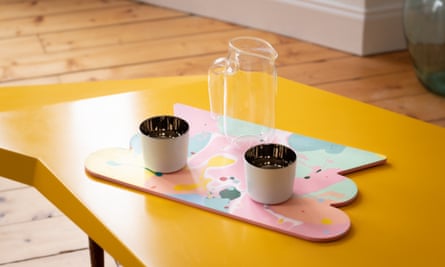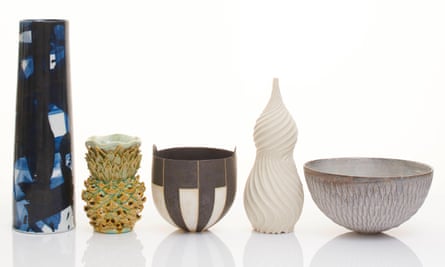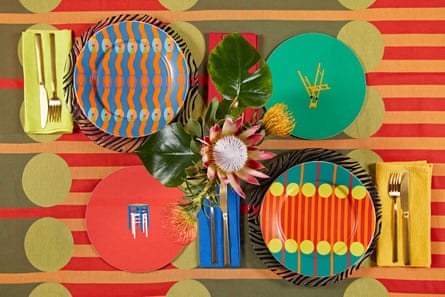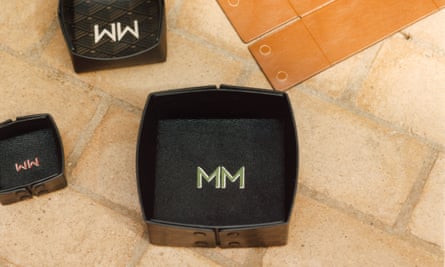As Christmas looms, remember ’tis the season to be jolly but also to consume wisely and consider the impact of what gifts you buy and where you buy them from. Craft is one of many industries that has taken a real beating this year. This sector includes small businesses, freelancers and self-employed makers who have found it hard to access government aid, suffered supply shortages and have lost trade with shops shut at the busiest time of year. So please, this year if you can, check out independent platforms and retailers, such as the Home of Sustainable things and Percy Langley or Cockpits Arts digital market, or other small businesses who could benefit from your support, before clicking on Amazon. Let’s make this Christmas happy for as many people as we can.
1
Happy homeware

If 2020 feels like it’s lacked colour and fun, designer Adam Nathaniel Furman may have the answer. Furman has teamed up with material designer Mirrl to create a homeware range of mats, coasters and mirrors in shades reminiscent of ice-cream parlours and birthday parties.
Mirrl is a Glaswegian start-up manufacturing a beautiful, durable furniture material – also called mirrl – made from plywood treated with resins and dyes to create distinctive patterns. It’s inspired by Mirrl co-founder Simon Harlow’s time in Japan, where he discovered the 600-year old decorative technique known as tsugaru nuri and adapted it to create mirrl.
Though mirrl comes in many colours, the bright splash of the new homeware range is very Furman. The young designer is part of the New London Fabulous movement – a group of creatives bringing colour and pattern to the UK through architecture, interiors and street art. These homewares are no exception. As Furman says: “Together we have created a joyful line of little accoutrements for a touch of domestic pleasure.”
2
Self-reliance during self-isolation

The artist and founder-editor of the website Design Observer, Jessica Helfand, spent the early months of the pandemic holed up in New Haven, Connecticut. Rather than baking banana bread, she wrote essays on what it means to be a maker during a crisis, and how making might lead to self-knowledge. She called the series The Self Reliance Project – a reference to the 1841 essay by philosopher Ralph Waldo Emerson, in which he argues for trusting your instincts in times of uncertainty.
Now 12 of the essays have been published, with Emerson’s original text, in a re-edition by publishing platform Volume. Working with designer Jarrett Fuller, Helfand used graphics to draw out text themes in a font combining the Emerson typeface (designed by Joseph Blumenthal for an Emerson essay in the 1930s), with Neue Haas Unica (a hybrid of Helvetica, Univers and Akzidenz Grotesk, adapted by Toshi Omagari, digitally released by Monotype in 2015). It’s a type nerd’s dream.
There are six covers to choose from, too, created by architect Sir David Adjaye, illustrators Yuko Shimizu and Maira Kalman, designer John Maeda, collage artist Kensuke Koike and photographer Daniella Zalcman. Each has a different take on self-reliance.
Designed as a pocketbook to be referred to in daily life, Self-Reliance aims to set a new standard for classic re-editions. It’s the sort of book you might give as a “hang in there” present to the poor, quarantined university student in your life. Bold double-page spreads proclaim some of Emerson’s most thought-provoking quotes: “Our minds travel when our bodies are forced to stay at home.” Indeed. Augusta Pownall
3
Ceramics for society

“I passionately believe making with hands has therapeutic benefits that all children should be able to experience,” says ceramicist Kate Malone. This belief led her to organise FiredUp4, an exhibition and auction to raise money to build pottery studios for youth charities in the north of England. The idea for FiredUp4 was simple. During London Craft Week in September, Malone asked makers to contribute a ceramic made from 3kg of clay. Some of the best potters working today answered the call, including John Ward, Barnaby Barford, Akiko Hirai and Alison Britton. As Edmund de Waal, also a contributor, says: “Clay is inexhaustible. It allows you to explore multiple ideas and possibilities, to return to play, to make mess, take up space, feel your way into skills, colour and texture, and connect to histories and cultures. Why wouldn’t we want our kids to have it in their hands?”
Last week’s auction made a remarkable £105,182, so the dream of building, supplying and staffing pottery studios in centres that cater for over 50,000 young people every year is that little bit closer to reality. “We believe that with the right tools, support and guidance, young people can achieve their full potential,” says Janine Blythe, chief executive of the Chorley Inspire Youth Zone. “By supporting FiredUp4, you help provide hundreds of young people with the experience of art.”
4
Design for life

Arthritis affects more than 10 million people in the UK. This painful condition causes inflamed joints and makes even simple daily tasks difficult. New social venture Arthr wants to help with that. The company develops and creates products that are ergonomic, useful tools for arthritis sufferers with limited dexterity. Arthr products are also aesthetically pleasing, after research showed many arthritis sufferers were embarrassed by medical-looking gadgets.
Seeing the bright colours and pleasing shapes of the mobile phone holders, key rings and bath steps available from Arthr, it’s no surprise that the design team is led by an ex-Lego designer. Adam Vaughan created products aimed at girls for the Danish brand before moving into the more challenging field of disability aids.
As well as helping people with arthritis, Arthr donates all of its profits to Versus Arthritis, the UK’s largest charity dedicated to supporting those living with the condition.
5
The art of country living

Grizedale Arts is hoping for an early Christmas present this year. The award-winning institute has a deadline of 18 December to raise funds to buy the Farmer’s Arms Inn, a 600-year-old, grade II-listed building at Spark Bridge, in Cumbria’s Crake Valley. The inn has been empty for a year, protected as an asset of community value, but that order runs out next month.
Grizedale Arts is an unusual organisation – preserving traditional crafts, promoting a global community for innovative rural living and also supporting artists and local communities. Its aim is to promote creativity outside of the traditional art establishment. Grizedale Arts HQ is at Lawson Park farm above the Coniston valley in the Lake District, a smallholding with space for working artists and activities for locals – but all visitors are asked to help work the farmland during their stay.
The hope is to replicate the success of Lawson Park at the nearby Farmer’s Arms. Grizedale Arts has plans to restore the neglected inn into a pub and B&B, but also add workshops, a museum, pop-up shops, an experimental agricultural programme and a community arts centre.
Grizedale Arts director Adam Sutherland believes the Farmer’s Arms could become an interesting update of the traditional inn. “The pub model is struggling but that’s not to say it should be abandoned, rather it just needs a bit of reinvention. This would be a return to more erstwhile ways of working – more self-sufficient, diverse in its offer, economically connected to its immediate community, a more circular economy.”
6
Home is where the art is

Last year, Yinka Ilori’s focus was large-scale architectural projects. The British-Nigerian designer created a skate park in Lille, the Colour Palace pavilion in Dulwich for the 2019 London Architecture Festival and cheered up a gloomy underpass in south London for local residents. But, like most of us, 2020 has mainly been about time at home. The hours of lockdown have not been wasted, though: this December, Ilori launches his own homeware range, including enamel mugs, stoneware plates, cushions and rugs. “My collection is inspired by my British-Nigerian heritage and childhood,” says Ilori. “It’s a colourful celebration of two cultures through technicolour pattern and craft.”
The patterns include Omi – the Yoruba word for water – an azure wave pattern punctuated by oval motifs, inspired by the Thames and rum barrels stacked at the Royal Docks, and Gangam which features a pineapple design referencing trade with Africa.
“Each item is meant to instil a sense of optimism,” says Ilori, “to act in their own small way as a distraction to the dark times that we’re facing this year.”
7
Thinking outside the box

As an independent travel accessories designer, Melissa Morris of Métier has not had a good year. At a time when a trip to the local supermarket is big news, her elegant, handmade weekend bags, garment carriers and passport wallets have been woefully underemployed. Few got to experience the care and attention that has gone into Morris’s clever storage systems that buckle, zip and fold into each other to create the perfect bag for any trip. Undaunted, she has added to her range to cater for the seasoned traveller who now needs to set up office in the kitchen, rather than Paris.
Her new Art of Living collection of pencil cases, desk tidies and document holders can make you feel important on a Zoom call from your spare bedroom. One new item is a foldable canvas box. Morris made the prototype from her business insurance policy back in April when she read it and realised it was utterly worthless. Instead of ripping it up, she started folding and turned it into a covetable box instead. Not the sort of circular economy that design usually focuses on, but every little counts.
8
Christmas with Cockpit Arts

Today, social enterprise Cockpit Arts launches a new, online, digital Makers’ Market. Every year the charity provides invaluable support for British makers – including studio space, tools and business advice, with 30 new makers receiving bursaries each year. The Cockpit studios in Deptford and Holborn are also home to 150 independent businesses. Obviously, 2020 has been an exceptionally difficult year for everyone, but more help is needed for workshops and craftspeople than ever before.
A recent Oxford Economics Report forecast £1.5bn a week in lost revenues for the creative industries this year, with more than 400,000 jobs at risk in the creative sector as a whole. Craft is particularly at risk. Consisting of small businesses and self-employed workers, the sector has had little government support, poor retail opportunities and disrupted access to raw materials. As a result, job losses are forecast to be as high as 47%.
So Cockpit Arts’ digital Makers’ Market gives the chance to buy unique products from makers who could go under without a boost from Christmas shoppers. There are ceramics, jewellery, leather goods, textiles and so much more to choose from. With prices starting from £3, it’s worth a look for, as Cockpit Arts chief executive Annie Warburton puts it, “gifts with meaning and soul”. Who doesn’t want one of those in their stocking?
Sign up for the Design Review newsletter to get a monthly dose of creative inspiration
Sign up for the Design Review newsletter to get a monthly dose of creative inspiration